HOW TO FIND COMPOSITION OF TWO FUNCTIONS
Let f : A -> B and g : B -> C be two functions. Then the composition of f and g denoted by g o f is defined as the function g o f (x) = g(f (x)) for all x ∈ A.
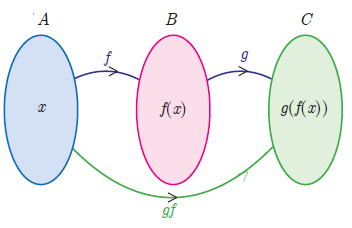
Generally, f o g ≠ g o f for any two functions f and g. So, composition of functions is not commutative.
Using the functions f and g given, find f o g and g o f. Check whether f o g = g o f .
Question 1 :
f(x) = x - 6 and g(x) = x2
Solution :
f o g = f[g(x)]
= f[x2]
= x2 - 6 ----(1)
g o f = g[f(x)]
= g[x- 6]
= (x - 6)2
= x2 - 2(x)(6) + 62
= x2 - 12x + 36 ----(2)
From (1) and (2), we see that f o g ≠ g o f.
Question 2 :
f(x) = 2/x and g(x) = 2x2 - 1
Solution :
f o g = f[g(x)]
= f[2x2 - 1]
= f(2x2 - 1)
= 2/(2x2 - 1) ----(1)
g o f = g[f(x)]
= g[2/x]
= 2(2/x)2 - 1
= 2(4/x2) - 1
= 8/x2 - 1 ----(2)
From (1) and (2), we see that f o g ≠ g o f.
Question 3 :
f(x) = (x + 6)/3 and g(x) = 3 - x
Solution :
f o g = f[g(x)]
= f[3 - x]
= (3 - x + 6)/3
= (9 - x)/3 ----(1)
g o f = g[f(x)]
= g[(x + 6)/3]
= 3 - [(x + 6)/3]
= 9/3 - [(x + 6)/3]
= [9 - (x + 6)]/3
= (9 - x - 6)/3
= (3 - x)/3 ----(2)
From (1) and (2), we see that f o g ≠ g o f.
Question 4 :
f(x) = 3 + x and g(x) = x - 4
Solution :
f o g = f[g(x)]
= f[x - 4]
= 3 + x - 4
= x - 1 ----(1)
g o f = g[f(x)]
= g[3 + x]
= 3 + x - 4
= x - 1 ----(2)
From (1) and (2), we see that f o g = g o f.
Question 5 :
f(x) = 4x2 - 1 and g(x) = 1 + x
Solution :
f o g = f[g(x)]
= f[1 + x]
= 4(1 + x)2 - 1
= 4(1 + 2x + x2) - 1
= 4 + 8x + 4x2 - 1
= 4x2 + 8x + 3 ----(1)
g o f = g[f(x)]
= g[4x2 - 1]
= 1 + 4x2 - 1
= 4x2 ---(2)
From (1) and (2), we see that f o g ≠ g o f.
Question 6 :
Let f(x) = 1 - 2x and h(x) = f(g(x)). Fill in the table.
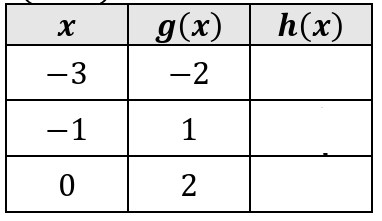
Solution :
f(x) = 1 - 2x
h(x) = f(g(x))
When x = -3
h(-3) = f(g(-3))
= f(-2)
Evaluating f(-2) using the function 1 - 2x :
f(-2) = 1 - 2(-2)
= 1 + 4
= 5
When x = -1
h(-1) = f(g(-1))
= f(1)
Evaluating f(1) using the function 1 - 2x :
f(1) = 1 - 2(1)
= 1 - 2
= -1
When x = 0
h(0) = f(g(0))
= f(2)
Evaluating f(2) using the function 1 - 2x :
f(2) = 1 - 2(2)
= 1 - 4
= -3
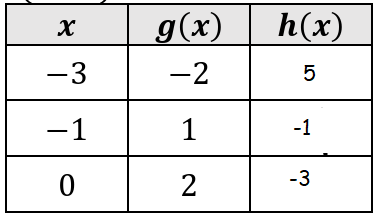
Question 7 :
Let g(x) = 3x and h(x) = g(f(x)). Fill in the table.
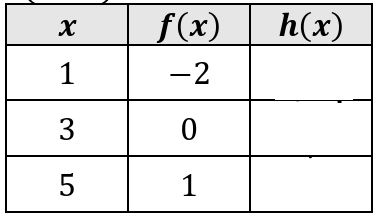
Solution :
g(x) = 3x and h(x) = g(f(x)).
When x = 1
h(1) = f(g(1))
= f(-2)
Evaluating f(-2) using the function 3x :
f(-2) = 3-2
= 1/32
= 1/9
When x = 3
h(3) = f(g(3))
= f(0)
Evaluating f(0) using the function 3x :
f(0) = 3-0
= 1
When x = 5
h(5) = f(g(5))
= f(1)
Evaluating f(1) using the function 3x :
f(1) = 31
= 3
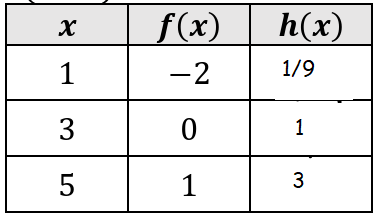
Question 8 :
Compare the quantity in column A with column B.
f(x) = 2x - 5 and g(x) = (1/2) (x + 5)
|
Column A f(2) |
Column B g(f(2)) |
[A]The quantity in Column A is greater.
[B]The quantity in Column B is greater.
[C]The two quantities are equal.
[D]The relationship cannot be determined on the basis of the information supplied.
Solution :
f(x) = 2x - 5 and g(x) = (1/2) (x + 5)
Evaluating f(2) :
f(2) = 2(2) - 5
= 4 - 5
= -1
Evaluating g(f(2)) :
g(f(2)) = g(-1)
Applying x = -1 in the function g(x)
g(-1) = (1/2) (-1 + 5)
= (1/2)(4)
= 2
[B]The quantity in Column B is greater is the correct answer.
Question 9 :
Given 𝑓(𝑥) = 5𝑥 - 2𝑏 while 𝑔(𝑥) = 4𝑏𝑥. If 𝑓[𝑔(1)] = 36, what is 𝑔(𝑓(1)) ?
Solution :
𝑓(𝑥) = 5𝑥 - 2𝑏 while 𝑔(𝑥) = 4𝑏𝑥.
g(1) = 36
g(1) = 4b(1)
g(1) = 4b
Applying the value of g(1), we get
f(4b) = 5 (4b) - 2b
= 20b - 2b
= 18b
36 = 18b
b = 36/18
b = 2
g(f(1)) = g(5(1) - 2b)
= g(5 - 2(2))
= g(5-4)
g(1)
Applying the value x = 1 in g(x), we get
g(1) = 4(2)(1)
= 8
Kindly mail your feedback to v4formath@gmail.com
We always appreciate your feedback.
©All rights reserved. onlinemath4all.com
Recent Articles
-
Digital SAT Math Problems and Solutions (Part - 150)
Apr 25, 25 11:46 AM
Digital SAT Math Problems and Solutions (Part - 150) -
AP Calculus AB Problems with Solutions (Part - 19)
Apr 24, 25 11:10 PM
AP Calculus AB Problems with Solutions (Part - 19) -
AP Calculus AB Problems with Solutions (Part - 18)
Apr 24, 25 11:06 PM
AP Calculus AB Problems with Solutions (Part - 18)
